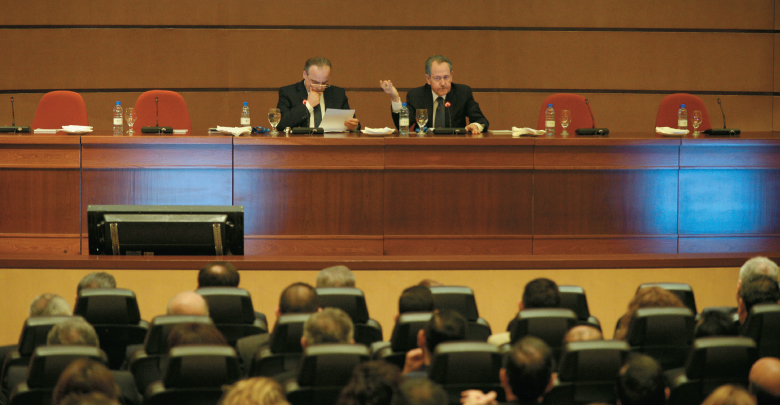On Friday, proceedings began for the “National Development Program: An Integrated National Vision for Economic and Social Development in Syria” conference in Damascus, run by the British Syrian Society. The conference aims to discuss what has been achieved in terms of the “Post-Crisis National Development Program,” launched by the Syrian government.
It is the third conference of its type that the association has held in Damascus since the start of the crisis about eight years ago, and will be held at the Damascus University amphitheater across two days.
The major damage and losses inflicted on material, human and social capital and the elements of development in Syria that the war has imposed, have obliged the Syrian government to develop a comprehensive strategic plan for the post-war stage. This plan relies on the capacities of Syria’s society and economy to achieve development and growth and at the same time show the government’s direction and planning for Syria in the future.
For that purpose, the Syrian government has launched the “Post-Crisis National Development Program for Syria” to ensure national ownership of Syria’s future and the need to plan for it and to revive all components of economic and social development. This program is based on five main aspects: the institutional aspect, the service aspect, the economic aspect, the social aspect, and the political.
The society said that during the conference there would be a discussion of, “what had been accomplished at the governmental level in the first four aspects of the National Development Program and the extent of their connection to other government programs such as the ‘Economic Public Sector Reform,’ ’the National Project for Modernization and Development of Legislation,’ and ‘the National Program for Administrative Reform.’”
It said that, “at the same time there will be an analysis of these accomplishments and the extent they have met the recommendations of the last two British Syrian Society conferences.”
The first day the conference’s program includes two sessions, the first to discuss, “The Institutional Aspect – Institution Building and Strengthening Integrity.” The second would discuss, “The Service Aspect – Developing and Modernizing Infrastructure.”
The second day would include three sessions. The first would discuss “The Social Aspect – Humanitarian and Social Development,” while the second would discuss “The Economic Aspect – Development and Growth.” The third is titled, “Seminar on the city of Damascus,” with an expert and open discussion.
The society held its first conference in Damascus in May 2017, and explored the daily living situation of Syrians in light of the fierce war waged against the country. A number of aspects related to the consequences and challenges faced by Syria were discussed, in terms of corruption and successive crises in various service sectors, as well as the scope for the future, and the opportunities that could be produced after the war at economic, urban and educational levels.
In January 2018, the society held its second conference regarding the government project for administrative reform which aimed to create fundamental administrative reform under which the Syrian state institutions work.
In each of the two conferences, the Prime Minister has participated, along with a number of ministers and officials from the Syrian government, as well as members of parliament, economic experts, academics, and university members. Facts and data around the issues were presented, and then the floor was opened for questions and discussion between the participants on all aspects addressed by the conference.
This article was translated and edited by The Syrian Observer. Responsibility for the information and views set out in this article lies entirely with the author.


